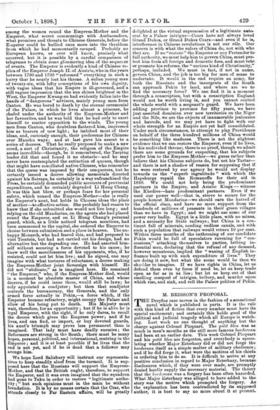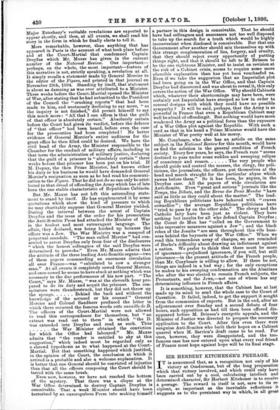M. BRISSON'S PROPOSAL. T HE Dreyfus case moves in the fashion
of a sensational novel which is published in parts. It is the rule with this kind of fiction that every number must have its special excitement; and certainly this holds good of the political and judicial tragedy which all Europe is watch- ing. Last week no one thought of anything but the charge against Colonel Picquart. The petit bleu was as much in men's mouths as the still more famous bordereaw had been at an earlier date. This week Colonel Picquart and his petit bleu are forgotten, and everybody is specu- lating whether Major Esterhazy did or did not forge the bordereau itself as a simple matter of military obedience ; and if he did forge it, what were the motives of his chiefs in ordering him to do so. It is difficult to arrive at any positive conclusion in regard to Major Esterhazy, because- disclosures which, if they were ever made, are promptly denied hardly supply the necessary material. The theory that the bordereau was a forgery has been often hazarded. What Major Esterhazy was alleged to have added to the story was the motive which prompted the forgery. As the explanation has been contradicted by its supposed author, it is best to say no more about it at present. Major Esterhazy's veritable revelations are expected to appear shortly, and then, at all events, we shall read his story in the form in which he finally elects to tell it.
More remarkable, however, than anything that has appeared in Paris is the account of what took place before and at the Court-Martial that condemned Captain Dreyfus which Mr. Mamie has given in the current number of the National Review. One important— perhaps, on the whole, the most important—feature of this narrative is not, strictly speaking, a revelation at all. It simply recalls a statement made by General Mercier to the editor of the Figaro, and printed in that journal on November 28th, 1894. Standing by itself, that statement is about as damning as was ever attributed to a Minister. Three weeks before the Court-Martial opened the Minister of War, after stating that he had submitted to the President of the Council the "crushing reports" that had been made to him, and unctuously declining to say more, " as the inquiry is not finished," did permit himself to say this much more : "All that I can affirm is that the guilt of that officer is absolutely certain." Absolutely certain before the Court had given its verdict, before the defence of "that officer" had been heard, before even the case for the prosecution had been completed ! No better evidence of General Mercier's entire unfitness for the great office he then filled could be desired. We have the civil head of the Army, the Minister responsible to the Chamber for the conduct of military affairs, including in that term the administration of military justice, declaring that the guilt of a prisoner is " absolutely certain " three weeks before that prisoner has been put on his trial. If M. Dupuy, the then Prime Minister, had known either his duty or his business he would have demanded General Mercier's resignation as soon as he had read his communi- cation to the Figaro. That he did not do so can only be attri- buted to that dread of offending the Army which has of late been the one stable characteristic of Republican Cabinets.
But Mr. Maxse has not left this astounding state- ment to stand by itself. He has supplemented it by some quotations which show the kind of pressure to which we may charitably suppose that General Mercier yielded. During the interval between the arrest of Captain Dreyfus and the issue of the order for his prosecution the Anti-Semitic Press had attacked the Minister of War in the foulest and most extravagant language. The affair, they declared, was being hushed up because the officer was a Jew. The War Ministry was a cesspool of perpetual scandals. "The man called Mercier" had con- sented to arrest Dreyfus only from fear of the disclosures " which the honest colleagues of the said Dreyfus were determined to provoke." Even Mr. Maxse admits that the attitude of the three leading Anti-Semitic organs—two of them papers commanding an enormous circulation all over France—was " calculated to cow a stronger man." At all events it completely cowed General Mercier, and once cowed he seems to have stuck at nothing which was necessary to the due performance of his new part. " The Court," says Mr. Marge' " was at the eleventh hour pre- pared to do its duty and acquit the prisoner. The con- spirators were thunderstruck, but they did not throw up the sponge Behind the back and without the knowledge of the accused or his counsel" General Mercier and Colonel Sandherr produced the letter in which there occurred the famous words cette canaille de D. The officers of the Court-Martial were not allowed to read this correspondence for themselves, but " an extract was read out to them " in which " the D. was extended into Dreyfus and read as such. Thus the War Minister obtained the conviction for which the Office had laboured." Mr. Maxse admits that " the reader is entitled to shy at this suggestion," which indeed must be regarded only as a shrewd hypothesis as to what happened at the Court- Martial. But that something happened which justified, in the opinion of the Court, the conclusion at which it arrived is a probable and also a welcome explanation. It is better that one General should be convicted of injustice than that all the officers composing the Court should be tarred with the same brush.
Even now, however, we have not reached the bottom of the mystery. That there was a clique at the War Office determined to destroy Captain Dreyfus is conceivable. That a weak Minister should have been terrorised by an unscrupulous Press into making himself a partner in this design is conceivable. That he should have had colleagues and successors not too well disposed to take up the search for a truth which would be highly inconvenient when disclosed is conceivable. But that one Government after another should mix themselves up with this strange conglomeration of lies, forgery, and cruelty, that they should reject every opportunity of putting things right, and that it should be left to M. Brisson to be the one righteous Minister, and to insist on revision at the risk of a Cabinet crisis, seems to require some more plausible explanation than has yet been vouchsafed us. Even if we take the suggestion that an Imperialist plot had been going on in the War Office, and that Captain Dreyfus had discovered and was about to reveal it, this only covers the action of the War Office. Why should Cabinets which, whatever their shortcomings may have been, were certainly not Imperialist have stooped so low in order to conceal designs with which they could have no possible sympathy P It will be said, perhaps, that the Army is so powerful in France that even a Republican Cabinet may well be afraid of offendingit. But nothing would have more weakened the Army as a political force than the exposure of a War Office plot against the Republic. With such a card as that in his hand a Prime Minister would have the Minister of War pretty well at his mercy.
Mr. Conybeare, who also has an article on the same subject in the National Review for this month, would have us find the solution in the general condition of French society. Every few years, he says, the French race " seems destined to pass under some sudden and sweeping eclipse of conscience and reason The very people who should guide and control the masses, the clergy, the poli- ticians, the journalists, the officers, put themselves at the head and march straight for the particular abyss which yawns before them." So it has been, he argues, in the Dreyfus case. All the papers of wide circulation are Anti-Semite. Even "great and serious" journals like the Temps, the Debats, and the Revue des Deux Mondes "have said as little as they could about the matter." The lead- ing Republican politicians have behaved with " craven cowardice " ; the average Republican politicians have "tried to pass by on the other side." The clergy and the Catholic laity have been just as violent. They have nothing but insults for all who defend Captain Dreyfus ; the Count de Mun has "called on the Government to take repressive measures against a Jew" ; and the black robes of the Jesuits " are seen throughout this vile busi- ness behind the bayonets of the War Office." When we read this tremendous array of charges, we are reminded of Burke's difficulty about drawing an indictment against a nation. We prefer to think that there must be more of ignorance—prejudiced ignorance, if you will, but still ignorance—in the present attitude of the French people, than Mr. Conybeare is willing to allow. If there be not, things are indeed in a bad way ; for the only exceptions he makes to his sweeping condemnation are the Alsatians who after the war elected to remain French subjects, the Protestants, and the Jews,—not one of whom has any determining influence in French affairs.
It is something, however, that the Cabinet has at last made up its mind to send the whole case to the Court of Cassation. It failed, indeed, to get the support it sought from the commission of experts. But in the end, after an adjournment over Sunday and a second debate of four hours, such opposition as had till then been offered dis- appeared before M. Brisson's energetic appeals, and the Minister of Justice was directed to prepare the necessary application to the Court. After this even there were sanguine Anti-Semites who built their hopes on a Cabinet quarrel when M. Sarrien's draft came to be read. For once, however, they were disappointed, and the too- famous case has now entered upon what every real friend of France must hope against hope will be its final stage.







































 Previous page
Previous page